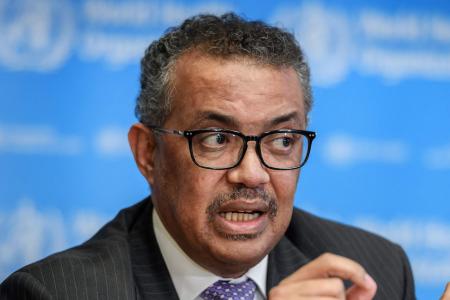WHO chief: Covid-19 will stalk planet for long time
WHO chief says some countries seeing resurgence, others still in early stages
GENEVA : Covid-19 will stalk the planet for a long time to come, the World Health Organisation (WHO) said on Wednesday, warning that most countries were still in the early stages of tackling the pandemic.
WHO chief Tedros Adhanom Ghebreyesus said some countries that thought they had the coronavirus under control were witnessing a resurgence in cases, while there were troubling upward trends in Africa and the Americas.
In the face of criticism, he also insisted that the United Nations health agency had declared a global emergency in good time for countries to prepare and plan their response.
The WHO has been blasted by the United States for its handling of the pandemic, but Dr Tedros brushed off calls for him to resign.
"Most countries are still in the early stages of their epidemics. And some that were affected early in the pandemic are now starting to see a resurgence in cases," he told a virtual press conference in Geneva.
"Make no mistake: we have a long way to go. This virus will be with us for a long time."
He said much of the epidemic in western Europe appeared to be stable or declining.
However, "although numbers are low, we see worrying upward trends in Africa, Central and South America, and eastern Europe".
The global death toll has passed 175,000, according to a tally from official sources compiled by AFP, while more than 2.5 million declared cases have been registered since the virus emerged in China in December.
The US has accused the WHO of sounding the alarm too late, being too soft on Beijing and even having covered up the outbreak.
US Secretary of State Mike Pompeo went on the attack on Wednesday, saying countries had a duty to report potential international public health emergencies to the WHO within 24 hours.
"We strongly believe that the Chinese Communist Party did not report the outbreak of a new coronavirus in a timely fashion," he said.
Mr Pompeo added that Dr Tedros had the power to go public if a member state was not following the rules, "and that didn't happen in this case either".
Dr Tedros said that the highest formal alert the WHO could trigger was declaring a global health emergency, which it did on Jan 30, when, outside China, there were 82 confirmed cases and no deaths.
"Looking back, I think we declared the emergency at the right time and when the world had enough time to respond."
SUPPORT
Separately, Australia's Prime Minister Scott Morrison said yesterday that all WHO member nations should support a proposed independent review into the coronavirus pandemic.
Mr Morrison has been urging several world leaders to support an international inquiry into its origins and spread, as well as the WHO's response.
Mr Morrison said all members of the WHO should be obliged to participate in a review, adding that Australia would push for the inquiry during the WHO Assembly on May 17.
"We'd like the world to be safer when it comes to viruses...
"I would hope that any other nation, be it China or anyone else, would share that objective," Mr Morrison said.
China said yesterday it will donate an additional US$30 million (S$43 million) to the WHO. - AFP, REUTERS
Get The New Paper on your phone with the free TNP app. Download from the Apple App Store or Google Play Store now



